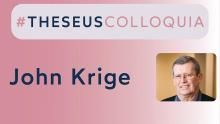Were we ever at peace? The irreversible entanglement of science, politics and regimes of knowledge control
The centrality of science and technology to the economic and military power of the state in a competitive world system has transformed the practice of science itself, and the role of the state in the political economy of knowledge production and circulation. The production of new knowledge flourishes when researchers and their novel ideas circulate beyond national borders, while it is in tension with the determination by the state to restrict some knowledge flows across borders in the name of national and economic security. This talk will describe the evolving policies adopted to regulate the transnational flow of sensitive, but unclassified knowledge and know-how by the US government since WWII in its competition for global influence with the Soviet Union and, more recently, with China. Attempts to reconcile ‘scientific internationalism’ with the regulation of sensitive knowledge and know-how devised during the Cold War have become increasingly brittle with China’s rise to prominence as a scientific and technological power. The scope for international scientific collaboration has contracted, and calls for decoupling the western and Chinese research systems are gaining traction along with calls to stop scientific collaboration with Russia after the invasion of Ukraine.
Introduction: Guido Saracco (Rector - Polytechnic University of Turin), Laura Montanaro (Pro-Rector - Polytechnic University of Turin), Stefano Sacchi (Coordinator Theseus Center on Technology, Society and Humanity - Polytechnic University of Turin ), Roberto Lalli (Professor of History of Science and Technology - Polytechnic University of Turin)
Speaker: John Krige, Professor emeritus at the School of History and Sociology at Georgia Tech in Atlanta. His research focuses on the intersection of the history of science, technology and foreign policy. He is co-author of Knowledge Regulation and National Security in Postwar America (University of Chicago Press, 2022) and curator of Knowledge Flows in a Global Age. A Transnational Approach (University of Chicago Press, 2022). In 2020 he was awarded the Francis Bacon Award in History and Philosophy of Science and Technology.
